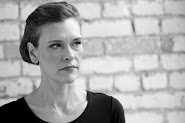As an experiment I have opened to a random page in Sylvia Plath's The Collected Poems (New York: Harper's and Row, 1981). The volume encompasses four collections of poetry: The Colossus, Ariel, Crossing the Water, and Winter Trees (all copyright dates 1960, 1965, 1971, 1981). She died in 1963 at the age of 30. Four of the poems in the collection originally appeared in The American Poetry Review and four in The New York Times Book Review. I opened randomly to page 162, poem numbered 143: "I Am Vertical" (28 March 1961):
I Am Vertical
But I would rather be horizontal.
I am not a tree with my root in the soil
Sucking up minerals and motherly love
So that each March I may gleam a new leaf,
Nor am I the beauty of a garden bed
Attracting my share of Ahs and spectacularly painted,
Unknowing I must soon unpetal.
Compared with me, a tree is immortal
And a flower-head not tall, but more startling,
And I want the one's longevity and the other's daring.
Tonight, in the infinitesimal light of the stars,
The trees and flowers have been strewing their cool odors.
I walk among them, but none of them are noticing.
Sometimes I think that when I am sleeping
I must most perfectly resemble them --
Thoughts gone dim.
It is more natural to me, lying down.
Then the sky and I are in open conversation,
And I shall be useful when I lie down finally:
Then the trees may touch me for once, and the flowers have time for me.
Two ten-line stanzas, pentameter couplets in the first stanza, mostly longer couplet lines in the second. If someone knows how to describe this metrically, or Plath's formalism, please do.
[Tiel Aisha Ansari writes, "If I had to describe this poem in formal terms, I think I'd say it's made up of two ten-line stanzas of unmetered slant-rhyme (very slant) couplets. There's a distinctive rhythm there but it doesn't answer to any metrical description."]
I wanted to see by way of this experiment, what I'd find in a randomly chosen poem. "Strewing" is the precise word. As I see it, it is a stirring but quiet nature poem that premeditates a passing -- or (past-)blooming -- death.
Here is a poem I wrote while consciously studying Plath in 1985 or 1986. I was 23 or 24 and working at a veterinary clinic after college. I remember working very hard on the poem while not approving of myself for cutting after her pattern.
Portrait of a House Guest
They stuck her there in the spare
dank corner, sheets like hers
spread out: folding roses,
winter daisies, yellow red
learned flower forms. Her
pale hair has wings,
independent movement, she has
Saturn eyes, Italian.
Reading under leafless trees
after a day grown fatter
they find her red, grazing
wool scarf. Like ashes
she catches them, stutters,
(it's part of her art),
"Let's cook when we're ready."
They never leave her,
the pale trusted nose,
but she's turning
like hookworm or maple leaf
wrinkled, trammeled, gold.
If something were suddenly to happen to end my life, and if someone going through my files put her or his hand randomly on this poem, I would (in my absence) feel reasonably at ease. The poem doesn't represent my writing 23 years later, but it represents my poetry then. There's no note to explain that I was studying Plath in the poem. What I have are letters -- sent and unsent -- not a diary. That I was studying Plath is not something I would have written to anyone then, but something my manfriend could see me doing at the (horizontal) door we used for a table. He might not recall it but like most readers recall the biography.
I avoided her biography in the sense that I was afraid to marry and have children, though I wanted to. I deliberately set out to have a career in teaching cw, based on my familiarity with another famous younger writer (not suicidal, socially or actually) who had done that.
That I felt uncomfortable patterning my work after Sylvia Plath's or other women writers' work as I later felt and continued to feel and to dodge them while reserving affection for their writing suggests their influence in a wider way. Is it a sign that a writer is "major" to wish to stay out of her path? As if being influenced by her were a proof of her magnitude. As if being influenced were in some way a show of the one's originality and the other's lack of it. There may be, even then, a depth to the reading that perceives originality.
Plath's novel The Bell Jar and her Journals further extend her body of work -- the journals alone seem "major."
[This entry is a reply to Annie Finch's query on the Women's Poetry Listserv. re: Sylvia Plath's standing as a "major" poet then under discussion at Harriet Blog. Christine Hamm plans to include this essay in an anthology about Plath's poetry not centered on her suicide. Slightly revised version appears at Fictionaut.]
Tuesday, March 31, 2009
Sylvia Plath's "I Am Vertical"
Labels:
essay,
Fictionaut,
inquiry (lit.),
nota. (lit.),
open letter,
poetry (line-)
Subscribe to:
Post Comments (Atom)













No comments:
Post a Comment